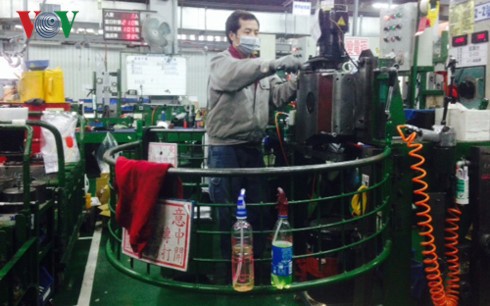(VOVworld) – The Trade Union, whose role is protecting the legitimate rights of working citizens, has been pushing to support Vietnamese workers overseas.
 |
| A Vietnamese worker in Taiwan (China) |
Each year, Vietnam sends up to 90,000 people to work abroad. Currently, about half a million Vietnamese people are working legally in 40 countries and territories. Vietnamese guest workers who send home 2 billion USD each year contribute greatly to the economic development of their families and of their homeland.
Protecting workers
The Law on Vietnamese Guest Workers which took effect in 2007 requires better protection of overseas workers amid Vietnam’s international integration. The 2012 Law on Trade Union underscores the role of the Union in counseling workers about work contracts, helping to resolve disputes, representing workers in lawsuits, and participating in labor-related cases.
The Trade Union has organized seminars on migrant workers, joined the Network of Information for Migrant Workers, and amended laws and regulations to better protect the rights of migrant workers and the trade union.
In July 2016 the Vietnam General Confederation of Labor and the Asia Foundation jointly implemented the project on strengthening the protection of Vietnamese guest workers. Trade Union branches provide information and counseling for those who are prepared to work overseas and job opportunities for those who have returned home. Workshops have been held to raise awareness of policy makers and relevant agencies about the issues facing workers. Filip Graovac, the Asia Foundation's Deputy Country Representative in Vietnam, told VOV about the project: “More importantly, we realize that local authorities, particularly VGCL's local network for staff holding leadership positions at ward and commune people's committees, can play a critical role in community-based communicators and counselors for safe migration. This is because they are the first stepping point on the recruitment process. However, their role is generally only focused on administrative procedures as they are not instructed or equipped with specific skills to provide pre-departure education for local communities.
Greater role
Despite recent efforts, the majority of guest workers cannot access trade union organizations, posing a major challenge for the Vietnam General Confederation of Labor. Dang Quang Dieu, Head of the Confederation’s Department of Social and Economic Policy and Emulation, suggested the establishment of a support network for people who wish to work overseas: “We will provide people with training courses and detailed information on the most credible centers or businesses for exporting workers.”
Le Thi Kim Ngan, Head of the Law and Policy Department of the Quang Ngai provincial Confederation of Labor, said: “Quang Ngai province has 75 full-time trade union officials. In the near future, we will select trade union cadres at communal level to give counseling on knowledge and skills needed to work overseas.”
Vietnam will take greater steps to protect the rights of migrant workers by signing memoranda of understanding with countries that receive workers and preparing to join the 1990 International Convention on the Protection of the Rights of All Migrant Workers and Members of Their Families. Sending people to work abroad is a major policy of Vietnam to help reduce poverty and improve the quality of labor. The policy’s success partly depends on the trade union’s protection of the rights of Vietnamese guest workers.